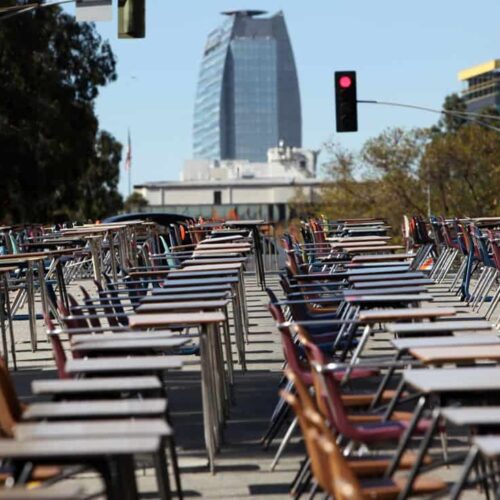Introduction
The nation’s second-largest school district — Los Angeles Unified — is unveiling a sweeping new agreement today to curb police involvement in minor school discipline and campus problems.
The agreement, more than two years in the making, is at the cutting edge of a national movement to stop sending students into courts for minor infractions at school.
In 2012, the Center for Public Integrity began publishing a series of reports documenting how L.A. Unified’s police — the nation’s largest school police department — were giving out more than 10,000 court citations a year to kids mostly for minor infractions.
Nearly half the kids ticketed, often for tardiness or fights, were 14 or younger; almost all were black or Latino and from lower-income areas, the Center found.
A 12-year-old boy was handcuffed and arrested in reaction to a first-ever fight with a friend during a basketball game — his parents were not called first — and two first graders were issued citations for disturbing the peace after a scuffle, the Center found.
The new protocol “is a significant step forward to ensuring that student behavior is not inappropriately criminalized but rather met with interventions that will address the root causes of a student’s behavior,” said Ruth Cusick, Los Angeles-based education rights attorney with Public Counsel, the nation’s largest pro bono law group.
“Taking school fights out of the courtroom and instead teaching students about conflict resolution will keep more students in school on a path to success,” Cusick she continued.
About 20 percent of all student arrests are related to fights. The new protocol sets out requirements for how students must instead be referred to counseling at school or at community sites known as YouthSource Centers.
Students accused of other misbehavior that has resulted in police issuing them court citations must now be referred back to school for counseling on a campus or at a YouthSource Center. These infractions can include minor use of alcohol, tobacco, marijuana possession or minor damage or theft of school property.
Public Counsel worked on the policy along with juvenile court judges, school administrators, police officials and the Community Rights Campaign, an L.A.-based group that has represented students in court.
The Community Rights Campaign was instrumental in proving that police were concentrating their efforts to nab tardy students in lower-income areas, even handcuffing some kids if they arrived minutes late.
Manuel Criollo, director of organizing for the Community Rights Campaign, said school playgrounds had become “minefields” of criminalization and that the protocol will help reverse the trend.
Los Angeles Juvenile Court Judge Donna Groman also hailed the new protocol in a press statement. Juvenile court, she said, “should be the last resort for youth who commit minor school-based offenses.” She said that she hopes that L.A. Unified’s policy “is shared both nationally and statewide as a model response.”
L.A. Unified Police Chief Steve Zipperman said, according to a press release, that the protocol “contains clear guidelines regarding the roles and responsibilities of …campus police officers and establishes criteria to assist officers in properly distinguishing school discipline responses to student conduct from criminal responses.”
Last year, Zipperman announced that officers would no longer issue court citations to students 12 or younger unless there were extraordinary reasons for such an action.
In their press release announcing the new protocol, community groups said: “National reports show that police contact with young people is a strong predictor of whether a student will fail to finish school, will have to repeat a year, or will end up in the juvenile justice system or criminal justice system,” community groups that negotiated the police protocols said in a press release.
“In fact,” the groups said, “just one arrest doubles a child’s chance of dropping out of school.”
Read more in Education
Criminalizing Kids
When schools call police on kids
Schools refer tens of thousands of students to law enforcement every year. Black children and students with disabilities get the brunt of it.
Criminalizing Kids
Our reports show why school police are under fire after Floyd protests
Districts removing cops or considering it after Black Lives Matter marches


Join the conversation
Show Comments